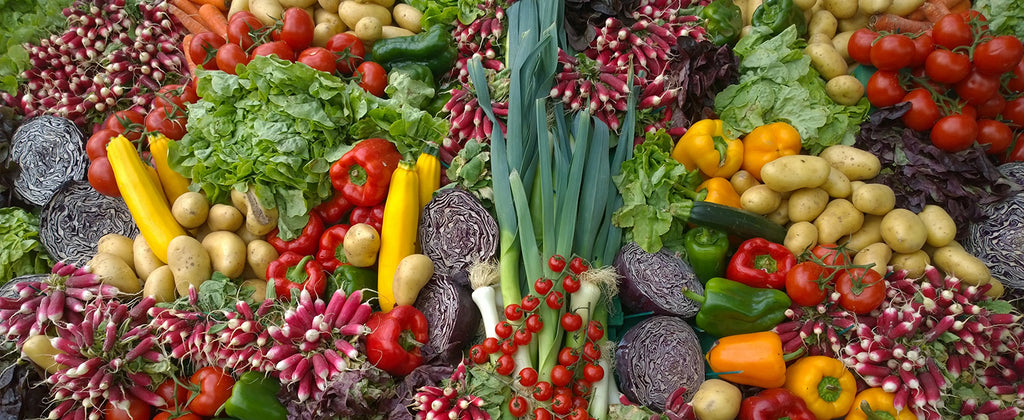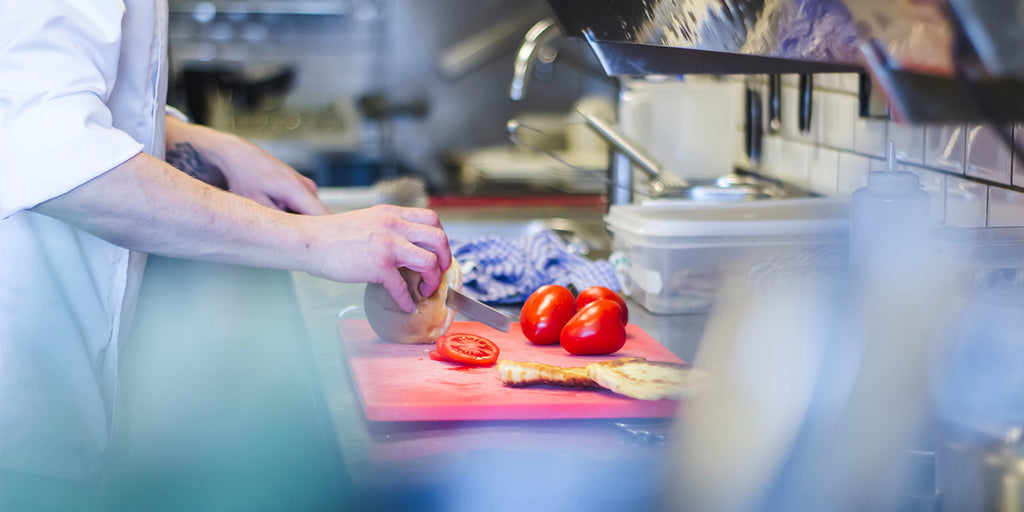Safe Vegetables for Dogs
NOTE: Always think twice before giving your dog any new "people foods". Some healthy food for us might not be good for your dog, depending on multiple factors, such as their health history&conditions, age, and diet. Dogs on prescription diets should not be fed any food or treats outside the diet.

What Veggie Is Good For Dogs?
Celery
Celery is rich in vitamin A, which helps improve your pet’s vision, as well as vitamins B, C, and K, potassium, and manganese. This low-calorie vegetable is a great natural breath freshener for dogs and many pups love to chew its crunchy texture, but be careful about the amount you serve. Celery is a natural diuretic, so if fed in large amounts, it can make your dog urinate more frequently.
Broccoli
Broccoli is a good source of fiber, vitamins A, C, E, and K, and contains almost no fat. Make sure to chop the stalks into small pieces as they can easily get lodged in your pet’s throat. It should also be noted that broccoli florets contain isothiocyanate, a potentially harmful ingredient present in all cruciferous veggies such as cabbage, cauliflower, and kale, which can cause stomach pain in some dogs.
Cabbage
This cruciferous vegetable contains vitamins C, B1, B6, and K, as well as phytonutrients that work to improve the overall health of your canine companion. However, cabbage should only be fed in moderation, as it will make your pet gassy. Raw cabbage also contains thiocyanate, which can suppress the thyroid gland and lead to hypothyroidism in dogs if consumed in large amounts.
Carrots
Carrots are rich in dietary fiber, vitamins B, E, C, D, and K, and low in calories. When eaten raw, these orange veggies can help keep your doggy’s teeth clean. However, raw carrots can be difficult to digest, which is why it might be a better idea to serve them steamed.
Asparagus
Asparagus is rich in vitamins B6, C, E, and K, thiamin, niacin, and minerals like copper, potassium, chromium, and selenium. Raw asparagus for dogs make a great alternative to chew sticks. Consider grilling or steaming the spears to make them easier to swallow.
Zucchini
Zucchini is low in calories, rich in fiber, and offers an abundance of vitamins and minerals that strengthen dogs’ bones, kidneys, and hearts. It’s best to steam the zucchini before serving it to your pet to soften the skin.
Cauliflower
Cauliflower provides omega-3 fatty acids, biotin, manganese, phosphorus, as well as vitamins B, C, and K, all of which are great for strengthening the immune system. Similar to other cruciferous vegetables on this list, cauliflower is safe only in small amounts as it can make your dog gassy. Raw cauliflower is difficult to digest so it’s best to serve it to your pet lightly cooked (steamed).
Beans
Black, pinto, red kidney, and butter beans are a great source of plant protein and nutrients like potassium, magnesium, and folate. However, they can easily cause gas, so they should be fed in moderate amounts. Green beans are great for dogs because they’re full of nutrients and can be served raw, steamed, or even canned, as long as they’re plain.
Potatoes
Dogs can safely consume potatoes, as long as they’re well cooked (boiled, baked, or steamed) all served plain. Never feed your pet raw potatoes, as they contain solanine, a compound that can be toxic to dogs. Fried potatoes should also be avoided because they’re high in fat.
Spinach
Dogs can eat spinach, a great source of iron, magnesium, vitamins A, C, and E. All these nutrients make this leafy green very effective in preventing inflammation, cardiovascular disease, and even cancer. On the flip side, spinach contains oxalic acid, a compound that blocks the absorption of calcium in the body and can cause damage to the kidneys, so it should be fed in moderation.
Kale
Kale is considered a superfood for humans and they offer health benefits for dogs, too. Rich in vitamins A, K, and calcium, this dark, leafy vegetable is great for canines’ vision, immunity, and bones. It’s also a good source of iron, the mineral responsible for healthy red blood cells. However, kale also contains calcium oxalate, a building block of some bladder stones, and isothiocyanates, which can cause gastric irritation in dogs and may even be toxic if consumed in large amounts.
Pumpkin
Pumpkin is chock-full of vitamins, minerals, and dietary fiber. It’s also low in calories, tasty, and aids digestion. Lightly cooked pumpkin is easiest for dogs to digest and, if fed in small quantities, it can help alleviate constipation in dogs. Canned pumpkin is also safe for dogs as long as it doesn’t contain sugar or additives. Pumpkin seeds can also be fed to dogs, but make sure they’re plain (no salt, butter, or oil).
Beets
Beets are rich in vitamin C, folate, manganese, potassium, and dietary fiber. Avoid feeding raw beets as they can be a serious choking hazard and obstruct your dog’s digestive tract. Cooked beets, on the other hand, contain oxalate, and should be avoided by dogs prone to bladder stones. These bright red veggies are also acidic in nature and can cause stomach upset, diarrhea, or vomiting in some dogs.
Cucumbers
Cucumbers are rich in vitamins B1, C, and K, as well as biotin, copper, potassium, and magnesium. They’re very low in calories, which makes them an ideal snack for dogs that are overweight. Cucumbers are also 96% water, so they make a perfect refreshing snack on a hot summer day.
Peppers
Peppers contain three times as much vitamin C as oranges which, combined with beta-carotene, helps strengthen the immune system, protect eyesight, and act as a natural anti-inflammatory. The best way to serve peppers is by steaming them in order to soften their exterior skin. If you decide to serve them raw, be sure to cut them into small pieces. Don’t forget to double-check if you’re feeding spicy pepper varieties to your pet.
Peas
Sugar snap, English, snow, and garden peas are all good for dogs. These little greens balls are rich in vitamins A, B, and K, minerals like iron, magnesium, potassium, and zinc, as well as fiber, protein, and lutein. Be sure to serve them in moderation as large amounts can cause diarrhea. Peas should not be given to dogs with kidney issues as they contain purines which can be difficult for the kidneys to process.
Sweet potatoes
Sweet potatoes and yams are very rich in fiber plus vitamins B6 and C. Like carrots, they also contain beta-carotene which improves skin and vision. Similar to regular potatoes, these orange veggies should only be served cooked (boiled or baked) and without any seasonings.
Brussels sprouts
Brussels sprouts are a great source of vitamins C and K, which makes them great for boosting immunity and improving bone health. They also contain antioxidants that fight against inflammation. Brussels sprouts aid digestion and can help if your dog is constipated, but they can also cause gas and result in flatulence. Be sure to cook the sprouts before offering them to your pet.
Lettuce
Similar to cucumber, lettuce contains a lot of water (90%), which makes it a perfect snack for overweight doggies. Be sure to chop the lettuce up before feeding to avoid a choking hazard.
How to Prepare Vegetables for Dogs

And be sure to remove any stems, leaves, seeds, cores, pits, or anything else that could become a choking hazard or cause an intestinal blockage.
All treats, even veggies, should be given in moderation. The total amount of treats should only make up 10% of your dog’s overall diet.